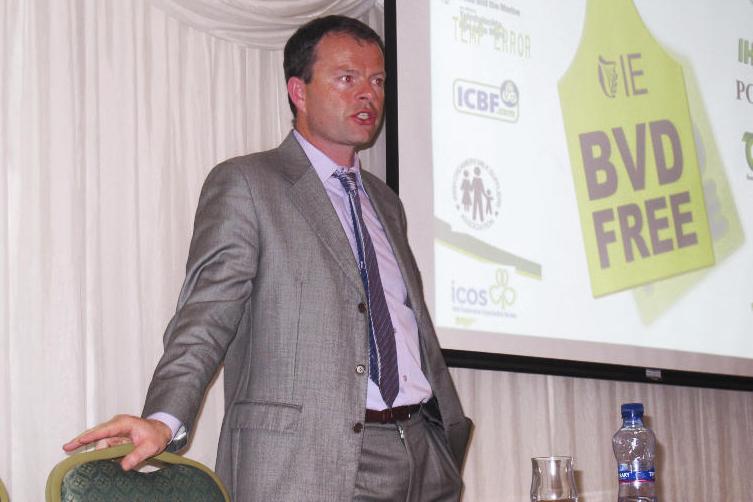Presenting to the Joint Oireachtas Committee on Tuesday this week, the CEO and chair of Animal Health Ireland (AHI), Joe O’Flaherty and Mike Magan, stressed that 2020 was still their target year for the eradication of BVD from the national herd.
“Our model work shows that 2020 continues to be the point of eradication,” O’Flaherty told members of the committee.
The chief executive also addressed last year’s controversy over the testing system for BVD, when it was concluded that “there is no viable alternative to tissue-tagging to achieve eradication of the disease.”
Original programme conditions
Under the original conditions of the programme, which began in 2013, testing for BVD would consist of three years of tissue-tagging followed by three years of lower intensity blood or milk surveillance.
We naively expected farmers to do the right thing
On Tuesday, O’Flaherty acknowledged to the committee that because of the slower than anticipated progress in terms of reducing the level of the disease, mainly due to the retention of persistently infected (PI) calves by farmers, AHI would not be able to keep tag testing within the timeframe that was initially estimated.
He did, however, express hope that the number of PIs will reduce in 2017, thanks to the changes in the financial support payments for farmers who get rid of PI calves within a certain timeframe brought in by Minister for Agriculture Michael Creed in 2016.
We were ‘naive’
On the issue of retention of PI calves by a minority of herdowners, AHI chair Mike Magan said: “We naively expected farmers to do the right thing. Human nature is strange and complex thing and people do things for a variety of reasons.”
However, the chair added that AHI likes to think it will be able to “complete the job of BVD eradication”.
Forced removal of PIs
O’Flaherty added that the reason why forced removal of PIs was not an original component of the scheme is that forced removal would trigger compensation by the State and when the scheme was being set up there was “no appetite to go down the route of compulsory compensation like with the TB eradication scheme”.
Read more
Full coverage: BVD
Presenting to the Joint Oireachtas Committee on Tuesday this week, the CEO and chair of Animal Health Ireland (AHI), Joe O’Flaherty and Mike Magan, stressed that 2020 was still their target year for the eradication of BVD from the national herd.
“Our model work shows that 2020 continues to be the point of eradication,” O’Flaherty told members of the committee.
The chief executive also addressed last year’s controversy over the testing system for BVD, when it was concluded that “there is no viable alternative to tissue-tagging to achieve eradication of the disease.”
Original programme conditions
Under the original conditions of the programme, which began in 2013, testing for BVD would consist of three years of tissue-tagging followed by three years of lower intensity blood or milk surveillance.
We naively expected farmers to do the right thing
On Tuesday, O’Flaherty acknowledged to the committee that because of the slower than anticipated progress in terms of reducing the level of the disease, mainly due to the retention of persistently infected (PI) calves by farmers, AHI would not be able to keep tag testing within the timeframe that was initially estimated.
He did, however, express hope that the number of PIs will reduce in 2017, thanks to the changes in the financial support payments for farmers who get rid of PI calves within a certain timeframe brought in by Minister for Agriculture Michael Creed in 2016.
We were ‘naive’
On the issue of retention of PI calves by a minority of herdowners, AHI chair Mike Magan said: “We naively expected farmers to do the right thing. Human nature is strange and complex thing and people do things for a variety of reasons.”
However, the chair added that AHI likes to think it will be able to “complete the job of BVD eradication”.
Forced removal of PIs
O’Flaherty added that the reason why forced removal of PIs was not an original component of the scheme is that forced removal would trigger compensation by the State and when the scheme was being set up there was “no appetite to go down the route of compulsory compensation like with the TB eradication scheme”.
Read more
Full coverage: BVD






 This is a subscriber-only article
This is a subscriber-only article











SHARING OPTIONS: